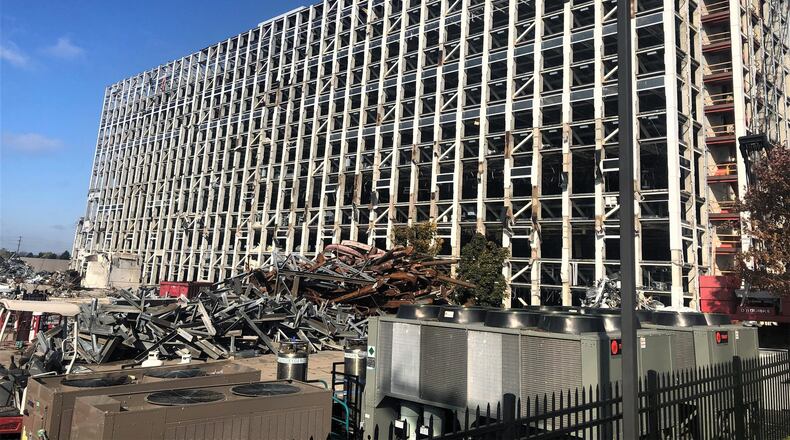The city is seeking an independent engineering review of the property so it can fully respond to Premier’s request, said Ford Weber, Dayton’s director of economic development.
“It’s extremely important that we have a readily developable site,” Weber said.
Premier Health said any deep-drilled piers that are found would be very stable and would offer good compacted material to support future projects on the site.
“Based on our research, we believe that any deep-drill piers remaining at the site would not interfere with future construction of a building up to at least eight stories,” the health care organization said.
RELATED: Good Samaritan outside demolition to start soon
Dayton’s demolition policy requires all structures and their foundations slated for demolition to be completely torn down and removed, Weber said.
The city wants vacant lots improved to a level where subsurface conditions are suitable for any likely reuse of the property, he said.
Premier asked for the waiver on the grounds that removing all the underground foundation on the Good Sam property is not practical given the cost, and the group claims leaving it behind will not hinder future redevelopment, Weber said.
Premier made the controversial decision to close Good Sam in July 2018, citing underutilization and what it says were high costs related to the outdated hospital.
The city occasionally grants waivers based on set criteria spelled out in city code, Weber said. Waivers can be granted if removing the foundation is physically impractical, harmful to connected or adjacent property or if the removal would be environmentally unsafe or would require extensive environmental remediation, according to city code.
Another consideration is whether the costs of removal are not “economically justified” based on the intended uses of the property after demolition.
RELATED: A year later, hospital system stands behind Good Sam closing
Premier Health said it has always planned and budgeted for removing spread footers and foundation beneath the Good Sam buildings. But if deep-drill piers are discovered, they could cost more than $2 million to remove, Premier said.
Deep-drilled piers would be deep enough to support new structures on the site, reducing the costs of new construction, or they would be so deep that they do not cause any issues, unless the new building is also 10 stories tall, which is not expected, the group said.
The city says it wants more information before deciding whether to grant or deny a waiver. The city has issued a bid request for structural engineering services to evaluate the property, seeking a firm to identify the location and depth of the footings and foundation for the hospital tower and assess their re-usability.
The firm also will be asked to estimate the cost of removing the foundations and identify whether there would be any kind of limitations on future building if the materials are not pulled out.
Dayton City Manager Shelley Dickstein said the city over the years has received waiver requests related to commercial demolition projects, which can be granted if the remaining materials do not impede future development.
“The last thing we want to do is to approve a waiver that then pushes additional expenses onto any redevelopment activities,” Dickstein said.
Premier Health has committed $10 million for seed money for redevelopment of the site.
Dickstein said the city considered waivers for the Hollywood Gaming at Dayton Raceway project, which was built on a former Delphi manufacturing plant, and for the removal and redevelopment of automotive factory properties along the Mad River, which became Tech Town.
MORE: Expanded civil rights complaint criticizes Premier’s suburban growth
Premier expects to spend about $10.4 million to deconstruct, abate and complete other site work on the Good Sam property.
The organization said the deconstruction of Good Sam and site preparation remain on schedule, with an anticipated completion in the first quarter of 2020.
Five buildings being taken down combined have more than 1.2 million square feet of space. The tallest structure is 200 feet tall.
MORE: How Steve Rauch grew $500 into multimillion-dollar demo contracts
About the Author

